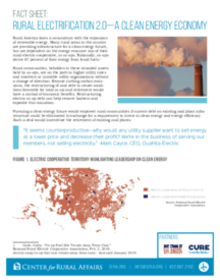Rural communities, beholden to these stranded assets held by co-ops, are on the path to higher utility rates and insolvent or unstable utility organizations without a change of direction. Beyond curbing carbon emissions, the restructuring of coal debt to create conditions favorable for total co-op coal retirement would have a myriad of economic benefits. Restructuring electric co-op debt can help remove barriers and expedite this transition.
Pursuing a clean energy future would empower rural communities if current debt on existing coal plant infrastructure could be eliminated in exchange for a requirement to invest in clean energy and energy efficiency. Such a deal would incentivize the retirement of existing coal plants.
This fact sheet is produced in partnership with Clean Up the River Environment (CURE) Minnesota and We Own It.


